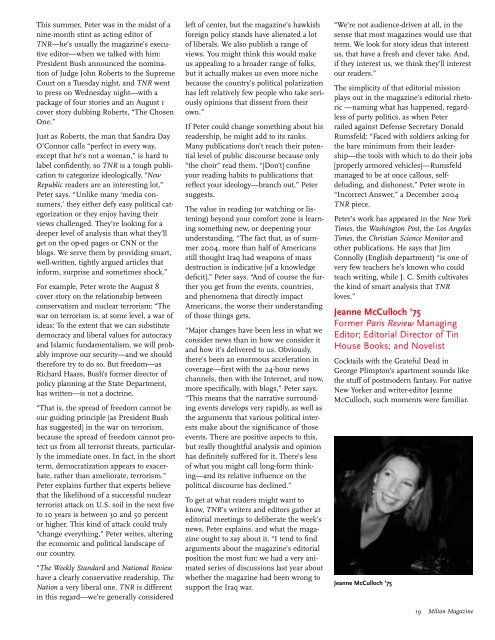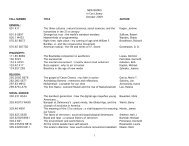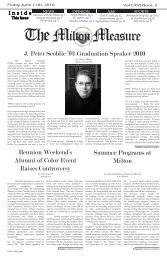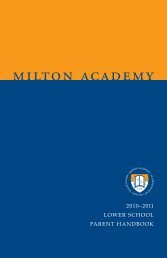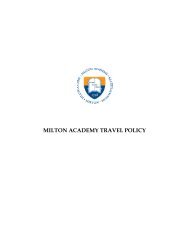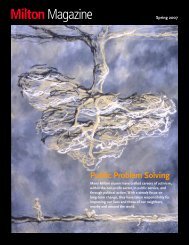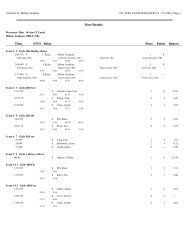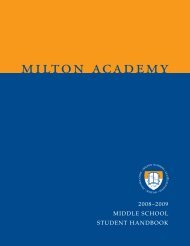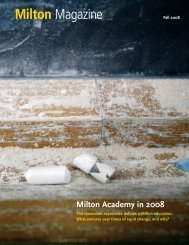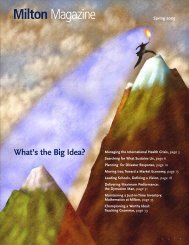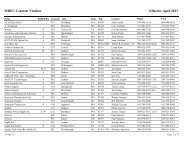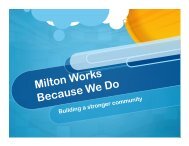You also want an ePaper? Increase the reach of your titles
YUMPU automatically turns print PDFs into web optimized ePapers that Google loves.
This summer, Peter was in the midst of anine-month stint as acting editor ofTNR—he’s usually the magazine’s executiveeditor—when we talked with him:President Bush announced the nominationof Judge John Roberts to the SupremeCourt on a Tuesday night, and TNR wentto press on Wednesday night—with apackage of four stories and an August 1cover story dubbing Roberts, “The ChosenOne.”Just as Roberts, the man that Sandra DayO’Connor calls “perfect in every way,except that he’s not a woman,” is hard tolabel confidently, so TNR is a tough publicationto categorize ideologically. “NewRepublic readers are an interesting lot,”Peter says. “Unlike many ‘media consumers,’they either defy easy political categorizationor they enjoy having theirviews challenged. They’re looking for adeeper level of analysis than what they’llget on the op-ed pages or CNN or theblogs. We serve them by providing smart,well-written, tightly argued articles thatinform, surprise and sometimes shock.”For example, Peter wrote the August 8cover story on the relationship betweenconservatism and nuclear terrorism: “Thewar on terrorism is, at some level, a war ofideas: To the extent that we can substitutedemocracy and liberal values for autocracyand Islamic fundamentalism, we will probablyimprove our security—and we shouldtherefore try to do so. But freedom—asRichard Haass, Bush’s former director ofpolicy planning at the State Department,has written—is not a doctrine.“That is, the spread of freedom cannot beour guiding principle [as President Bushhas suggested] in the war on terrorism,because the spread of freedom cannot protectus from all terrorist threats, particularlythe immediate ones. In fact, in the shortterm, democratization appears to exacerbate,rather than ameliorate, terrorism.”Peter explains further that experts believethat the likelihood of a successful nuclearterrorist attack on U.S. soil in the next fiveto 10 years is between 30 and 50 percentor higher. This kind of attack could truly“change everything,” Peter writes, alteringthe economic and political landscape ofour country.“The Weekly Standard and National Reviewhave a clearly conservative readership, TheNation a very liberal one. TNR is differentin this regard—we’re generally consideredleft of center, but the magazine’s hawkishforeign policy stands have alienated a lotof liberals. We also publish a range ofviews. You might think this would makeus appealing to a broader range of folks,but it actually makes us even more nichebecause the country’s political polarizationhas left relatively few people who take seriouslyopinions that dissent from theirown.”If Peter could change something about hisreadership, he might add to its ranks.Many publications don’t reach their potentiallevel of public discourse because only“the choir” read them. “[Don’t] confineyour reading habits to publications thatreflect your ideology—branch out,” Petersuggests.The value in reading (or watching or listening)beyond your comfort zone is learningsomething new, or deepening yourunderstanding. “The fact that, as of summer2004, more than half of Americansstill thought Iraq had weapons of massdestruction is indicative [of a knowledgedeficit],” Peter says. “And of course the furtheryou get from the events, countries,and phenomena that directly impactAmericans, the worse their understandingof those things gets.“Major changes have been less in what weconsider news than in how we consider itand how it’s delivered to us. Obviously,there’s been an enormous acceleration incoverage—first with the 24-hour newschannels, then with the Internet, and now,more specifically, with blogs,” Peter says.“This means that the narrative surroundingevents develops very rapidly, as well asthe arguments that various political interestsmake about the significance of thoseevents. There are positive aspects to this,but really thoughtful analysis and opinionhas definitely suffered for it. There’s lessof what you might call long-form thinking—andits relative influence on thepolitical discourse has declined.”To get at what readers might want toknow, TNR’s writers and editors gather ateditorial meetings to deliberate the week’snews, Peter explains, and what the magazineought to say about it. “I tend to findarguments about the magazine’s editorialposition the most fun: we had a very animatedseries of discussions last year aboutwhether the magazine had been wrong tosupport the Iraq war.“We’re not audience-driven at all, in thesense that most magazines would use thatterm. We look for story ideas that interestus, that have a fresh and clever take. And,if they interest us, we think they’ll interestour readers.”The simplicity of that editorial missionplays out in the magazine’s editorial rhetoric—naming what has happened, regardlessof party politics, as when Peterrailed against Defense Secretary DonaldRumsfeld: “Faced with soldiers asking forthe bare minimum from their leadership—thetools with which to do their jobs[properly armored vehicles]—Rumsfeldmanaged to be at once callous, selfdeluding,and dishonest,” Peter wrote in“Incorrect Answer,” a December 2004TNR piece.Peter’s work has appeared in the New YorkTimes, the Washington Post, the Los AngelesTimes, the Christian Science Monitor andother publications. He says that JimConnolly (English department) “is one ofvery few teachers he’s known who couldteach writing, while J. C. Smith cultivatesthe kind of smart analysis that TNRloves.”Jeanne McCulloch ’75Former Paris Review ManagingEditor; Editorial Director of TinHouse Books; and NovelistCocktails with the Grateful Dead inGeorge Plimpton’s apartment sounds likethe stuff of postmodern fantasy. For nativeNew Yorker and writer-editor JeanneMcCulloch, such moments were familiar.Jeanne McCulloch ’7519 <strong>Milton</strong> Magazine


